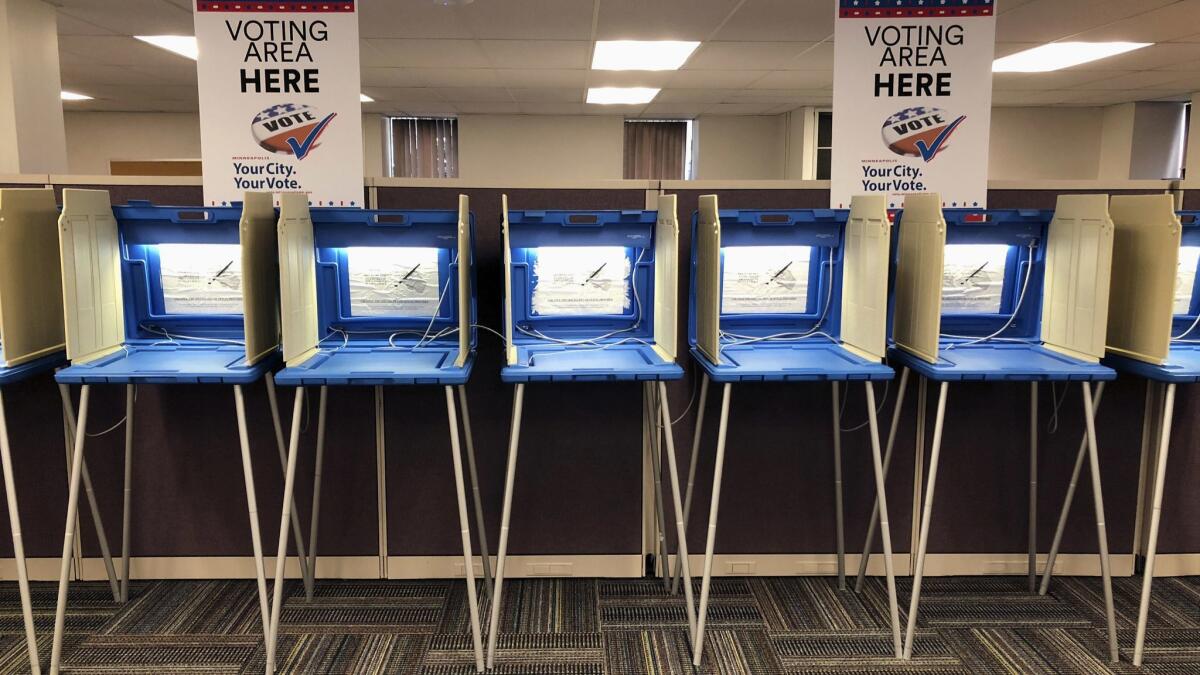Op-Ed: All that stands between American democracy and the abyss is your vote in November

- Share via
A bit over a month is left before the midterms, and I want to pose a question to any of my fellow Americans who might be tempted to sit out the vote. Do you not fully realize that the nation faces a crucial moment in its history, when all that stands between democracy and the abyss is citizen commitment and participation? Is it not clear that every vote can be an indispensable check to Donald Trump’s toxic misrule?
My questions are prompted by memories of another election that took place 30 years ago in Chile, the country I then called my own. That plebiscite would decide, like the November election in the United States, the fate of a people.
On Oct. 5, 1988, a referendum was held to determine if Gen. Augusto Pinochet, the dictator whose 1973 military coup had overthrown Chile’s constitutional government, should be allowed to stay in power.
At the time, it seemed mind-boggling that such an omnipotent and astute tyrant could be ousted using the ballot box. Indeed, most international observers — and many Chileans — did not think such a feat could be achieved given the terror and control exercised by Pinochet. Nor did the general himself believe he could lose, which is why he had agreed to the plebiscite in the first place.
Against the odds, 56% of the country told Pinochet he could no longer afflict us.
All national and local government posts were in the hands of the general and his civilian allies. The Congress and the Senate had been abolished. Craven judicial appointees did the dictator’s bidding. The economy was dominated by the old oligarchy allied with newly minted millionaires who used Pinochet’s deregulatory policies to create voracious cartels, looting the land and generating vast swaths of deprivation. Major newspapers, radio and television stations toed the official line; censorship strangled independent voices.
Most daunting of all, however, was the pervasive fear the regime cultivated. How could a populace that, for 15 interminable years, had suffered and witnessed widespread executions, massive torture, the exile and “disappearance” of dissidents, how could men and women who knew that a mere murmur of criticism could entail pain and perhaps death, be expected to contest the all-encompassing terror that plagued them?
The people’s dread was no abstraction. I have never forgotten my encounter with an old woman in a shantytown on the outskirts of Santiago just before the election. Like many other volunteers across Chile, I was part of a spirited effort to make sure people were aware how much each voice and vote mattered. That afternoon, the woman responded warily to my knock on her makeshift door, only inviting me in once she made sure nobody in the vicinity was watching. With the typical hospitality of the poor, she offered me a cup of tea with generous spoonfuls of sugar that she could ill afford.
When I was done explaining that nobody would ever know what she resolved in the secret of the voting booth, she was silent for a while and then: “He knows,” she said. “He has an eye inside the place where we vote, he knows everything we do. And he’ll take away my fonolita” — her roof. Even so, as I rose to leave, her voice dropped to a whisper and she breathed into my ear a message of defiance: “I’ll vote against him. I won’t waste my one chance to be heard.”
Enter the Fray: First takes on the news of the minute from L.A. Times Opinion »
A few days later, that woman joined almost 4 million other Chileans who voted “no” and defeated the dictatorship. Against the odds, 56% of the country told Pinochet he could no longer afflict us. It would not be easy, he would continue to be commander in chief of the army for another decade, but we could start the long, hard process of restoring our democracy.
That night, accompanied by my wife and our two sons, and surrounded by friends and neighbors, I danced in the streets of Santiago, a celebration repeated in towns and cities all over the country.
In retrospect, our triumph was not as strange and improbable as we had feared. It came out of a deeply democratic tradition that had been merely interrupted by the military coup. It came out of the struggle, sacrifice and hard work of hundreds of thousands of activists over the years, creating a safe space for people like the shantytown woman to express themselves. Their steadfast efforts and her kind of courage combined to make it clear that something as apparently inconsequential as one person’s hand marking a ballot, one word of hope whispered and acted upon, could change the course and curse of history.
It is this story that I invoke today as the United States faces a historic moment of reckoning. I’d like to believe that the citizens of the country of Lincoln and Rosa Parks, in easier and less threatening circumstances than those in Chile 30 years ago, are as courageous and devoted to freedom as that woman in Santiago. She had everything to lose, and yet managed to conquer her fear and doubts. I cannot believe, will not let myself believe, that we will not be dancing in the streets of America’s cities and towns on the night of Nov. 6, with the end of the Trump nightmare finally in sight.
Ariel Dorfman, an emeritus professor of literature at Duke University, is the author of “Death and the Maiden” and a new novel, “Darwin’s Ghosts.”
Follow the Opinion section on Twitter @latimesopinion and Facebook
More to Read
A cure for the common opinion
Get thought-provoking perspectives with our weekly newsletter.
You may occasionally receive promotional content from the Los Angeles Times.









